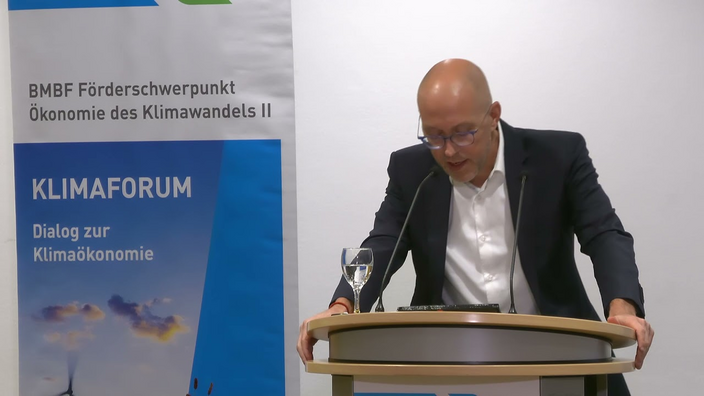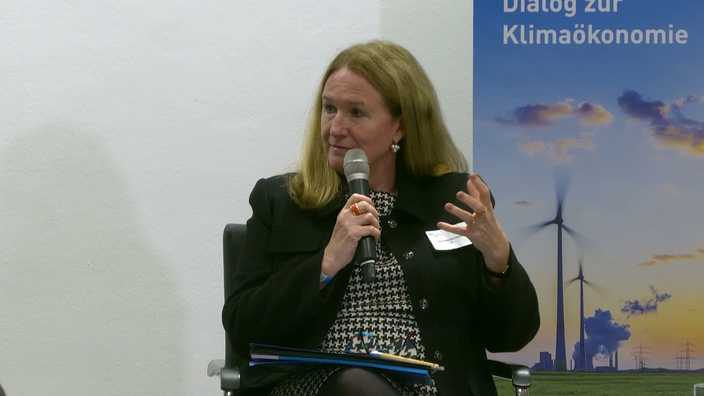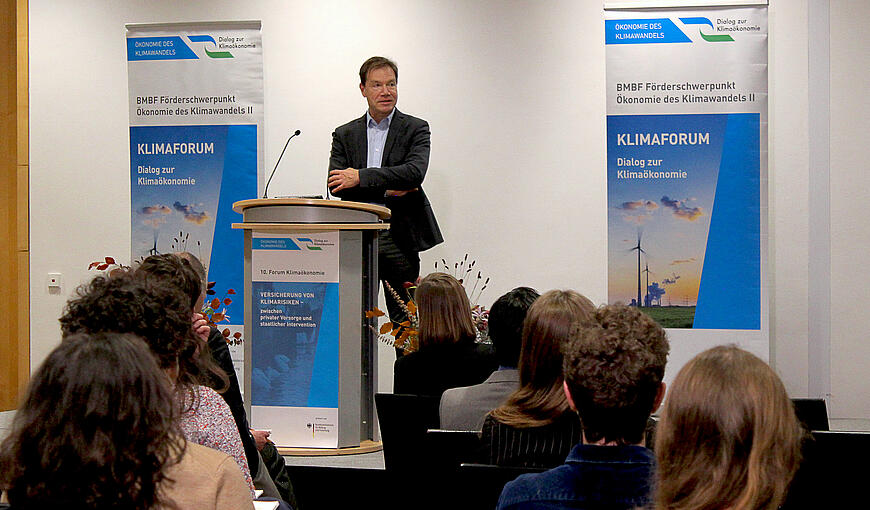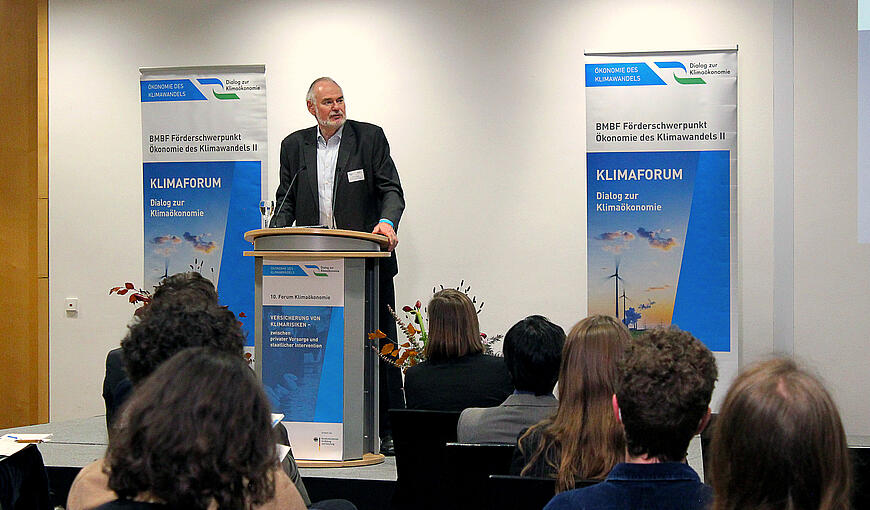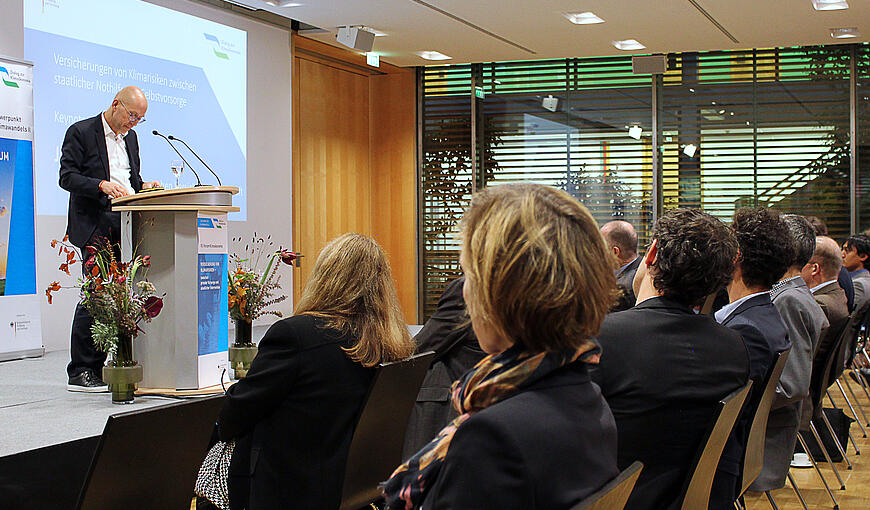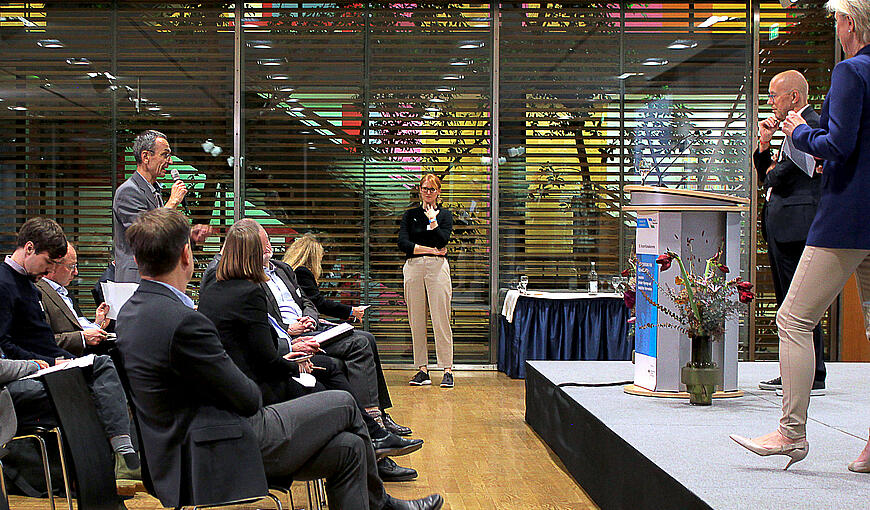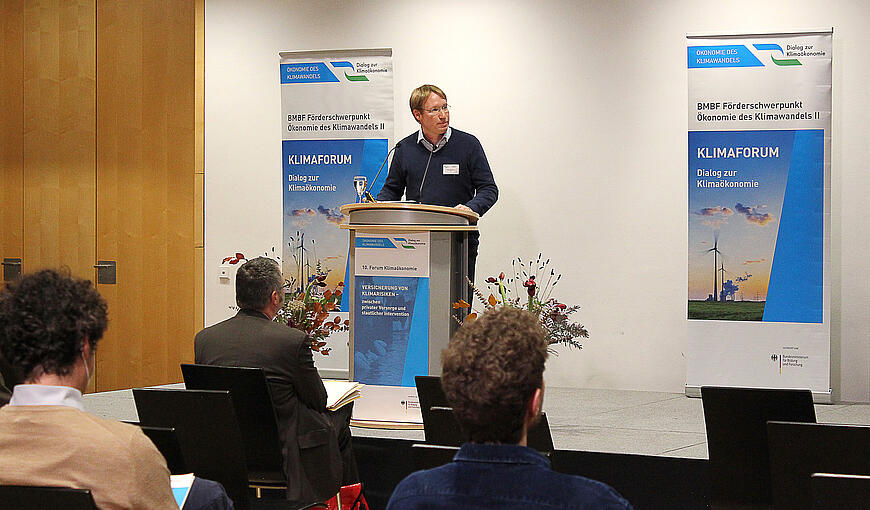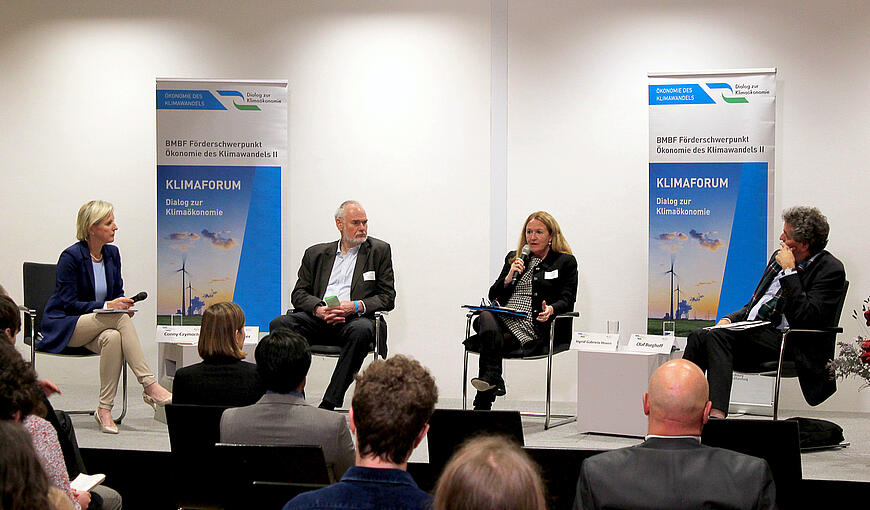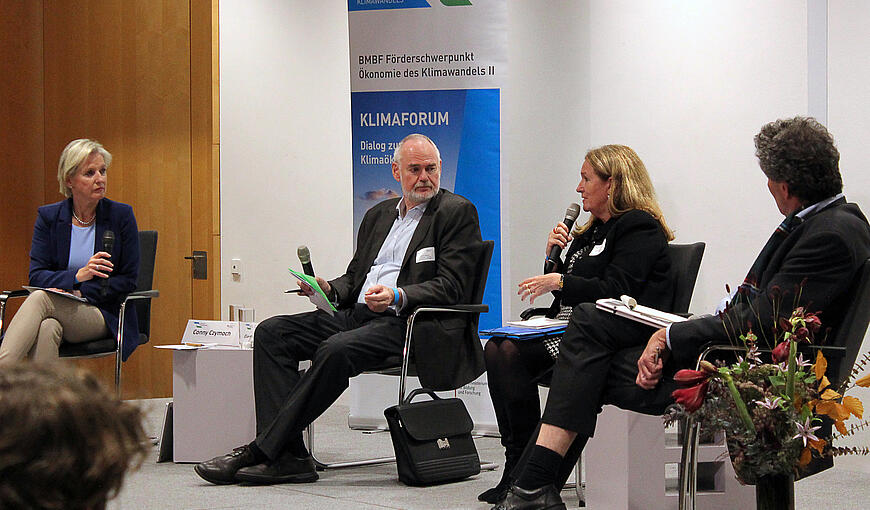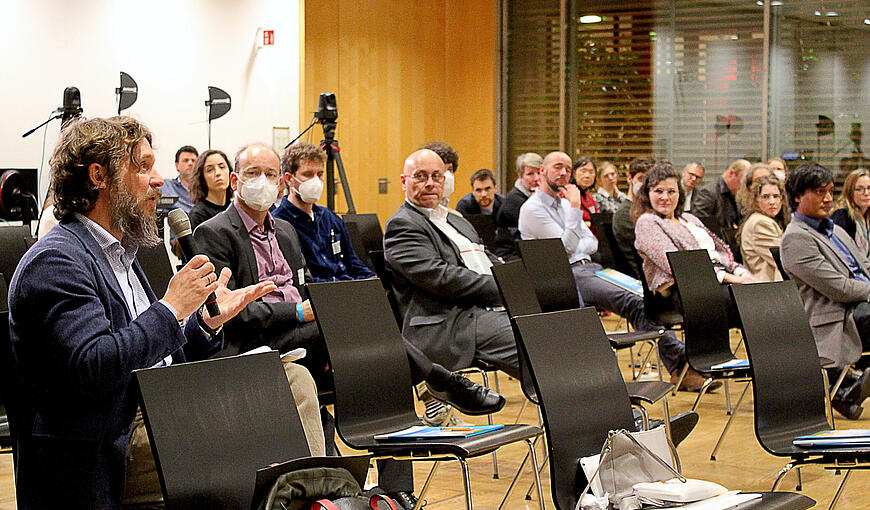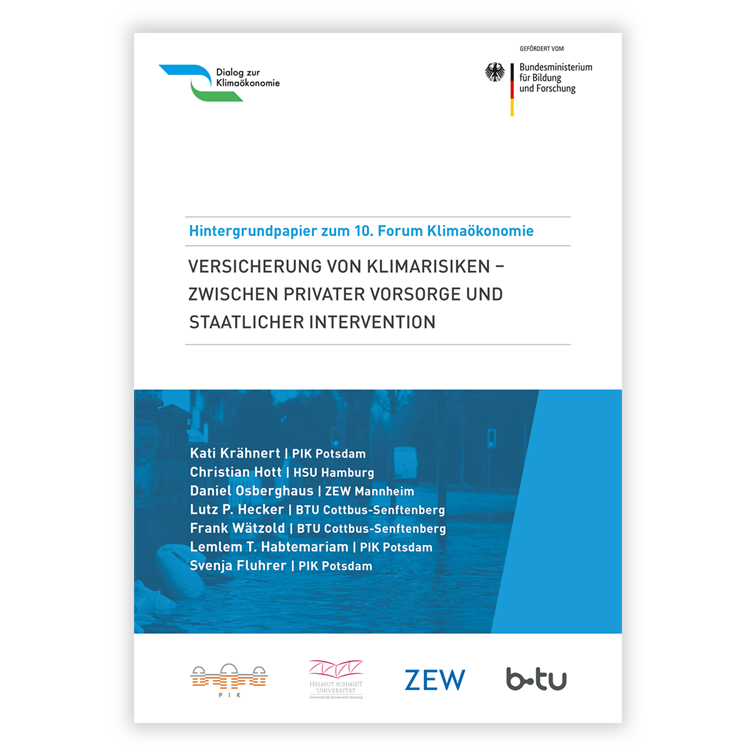Forum Climate Economics 10
Insurance of Climate Risks - Between Private Provision and Public Intervention
The Forum Climate Economics 10 finally back in presence - old format, fewer guests, new venue

On November 22, 2021, the Forum Climate Economics 10 "Insurance of Climate Risks - Between Private Provision and Public Intervention" took place in presence for the first time in almost two years. In strict compliance with the 2Gplus rules, the federal state representation of Schleswig-Holstein in Berlin provided an appropriate setting for around 50 guests from politics, business, civil society and science. They discussed current issues surrounding the topic of insurance against extreme weather events as an option for adapting to climate change: What role can and should private and public actors play in insuring against climate risks? How do insurance policies provide incentives for the private sector to adapt to climate change? Are insurance solutions socially just?
The new coalition should issue a mandate to examine compulsory insurance!
The series of welcoming addresses already emphasized the relevance of the subject in view of the flood events in the summer of 2021. In his keynote speech, Prof. Gert G. Wagner (Advisory Council for Consumer Affairs, SVRV) focused on the protection of residential buildings against natural hazards.
He argued that precautions should be strengthened - for example by tightening up building regulations (e.g. in the choice of location) and technical measures - and that the insurance density for natural hazard damage in Germany should be massively increased. Even with a high insurance density of 80% or even 95%, it is to be feared that high-risk residential properties in particular will not be reached due to excessively high risk-based insurance premiums. The introduction of mandatory insurance should therefore be considered. For incentive reasons, insurance premiums should always be graded according to risk. To avoid social hardship, compensation is needed for old buildings, for example in the form of needs-based state subsidies for insurance premiums. In a next step, it would now make sense to leave the purely conceptual level. The new government coalition should thus give the SVRV a serious mandate to examine the possibility of making insurance coverage for natural hazards compulsory.
A compulsory insurance scheme must not stand alone!
Jörg Asmussen (German Insurance Association, GDV) added in the second keynote that the current insurance density of 46% must be increased. The storm "Bernd" in July 2021 with 7 billion euros of insured losses alone and even greater economic losses had once again shown the need for action. However, a simple insurance obligation for natural hazards alone would not constitute a sustainable solution; it would have to be embedded in an overall system with three core elements:
1. mandatory steps for climate impact adaptation,
Such steps could include precautionary regulations in building code law, bans on new construction in exposed locations, the establishment of a federal natural hazard potential index, and mandatory climate risk assessments for building permits.
2. insurance coverage for private homeowners,
Since compulsory insurance for homeowners could be problematic from a constitutional perspective, GDV proposed a general conversion of all private residential building insurance policies from a cut-off date to insurance coverage against natural hazard damage in return for the payment of premiums proportionate to the risk. However, the policyholder would be given the option of completely waiving the insurance of natural hazard damage via a right of objection. Social hardships caused by insuring old properties at risk-based premiums should be cushioned by applying social legislation instruments. New buildings in officially designated floodplains, on the other hand, should no longer be able to obtain insurance coverage as of the effective date.
3. state liability for catastrophic accumulation losses.
Natural hazards are insurable in principle, but certain irreversible climate consequences (e.g., the possible shutdown of the Gulf Stream) have not been fully researched and cannot be quantified. They could therefore not be included in mathematical models. GDV therefore proposes a stop-loss rule here: From a significantly high loss amount that exceeds the capacities of private-sector natural hazard loss adjustment, the state should bear losses as the insurer of last resort.
Researchers and practitioners exchange ideas on natural hazard insurance, index-based insurance and insurance solutions in agriculture
In three parallel sessions, about 15 participants each examined details of various forms of insurance. These discussions formed the core of the forum and were delightfully lively and sometimes very controversial. Their core results are briefly outlined below:
Insurance against natural hazard damage in Germany: Do we need compulsory insurance?
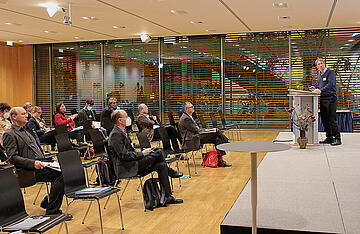
- In the status quo in Germany, "voluntary insurance markets with state backing" led to a comparatively low insurance density. In anticipation of state aid in the event of a catastrophe, there is little incentive to provide for one's own risk. At the same time, the ad hoc nature of government aid payments increases uncertainty for property owners, and portfolios in high-risk situations often remain without sufficient protection due to risk-based premiums.
- Options for a redesign would be the introduction of compulsory insurance, which would allow for a high insurance density, but is considered to be constitutionally problematic. Therefore, the opt-out option already presented by Jörg Asmussen would be a more elegant solution. Furthermore, government information campaigns on the risk situation, insurance options and tax-financed catastrophe funds should be taken into account.
Index-based weather insurance in the Global South: Are the great expectations being fulfilled?
- Index-based insurance not only strengthens the resilience of smallholder households to extreme weather events, it also enables more profitable investments by households and better access to credit. The success of an insurance product depends on the informative value of the chosen index. In the practical application in the field of development cooperation, however, index-based insurance as an instrument against extreme weather events must be embedded in a broader adaptation strategy.
- The discussion on linking insurance offerings to private adaptation and sustainable agricultural practices, identified the fluid transition between private sector insurance solutions and basic social welfare provided by the state as a critical issue, especially in the case of heavily subsidized insurance premiums.
Crop losses due to climate change in agriculture: The role of insurance solutions

- Insurance economics concepts such as accumulation risk, asymmetric information, adverse selection, and availability bias were introduced to the discussion and advantages of index-based insurance were explained. It was noted that crop loss insurance does not necessarily reduce the holistic entrepreneurial performance risk, as cropping decisions and self-reliant risk hedging could be influenced by it.
- In the policy approach to government support for risk management in agriculture, subsidized premiums aimed to promote insurance instruments and thus successively replace ad hoc aid disbursements were endorsed.
Consensus: Careful and informed insurance design is critical to the effectiveness and incentive compatibility of insurance solutions.
Panel discusses the role of private and public actors in insuring against extreme weather events

Moderated by Conny Czymoch, Ingrid-Gabriela Hoven (Executive Director of the German Corporation for International Cooperation GmbH, GIZ), Prof. Dr. Gert G. Wagner and Dr. Olaf Burghoff (Head of Statistics and Natural Hazard Modeling at GDV) discussed the role of private and public actors in insuring against extreme weather events.
In the context of the Global South, Ms. Hoven highlighted the important role of insurance solutions which provide rapid assistance in the event of a disaster, while government aid is sometimes slow or non-existent. The contractual right to payment, which those affected can invoke in the event of damage, provides an effective shield against the effects of climate change for small farmers, coastal residents and urban dwellers. The core tasks of the state in the Global South are the creation of a functioning regulatory framework for insurance markets that utilizes the expertise of the insurance industry, as well as investments in climate risk prevention and precautions that reduce the expected value of losses.

In the agricultural sector, special attention must be paid to insurance design. For example, a broad range of insurance products could counteract undesirable production distortions for society as a whole, which are caused by specialization in individual products insured against crop failure. Overall, insurance against extreme weather events (such as hail) works well in agriculture, but not so in areas with high accumulation risks (such as drought). It remained questionable to what extent government intervention, aid payments and subsidies could remedy this situation.
The topic of natural hazard insurance was also taken up in the panel discussion. Following the unexpected effects of Bernd, insurance models are currently being adapted to the new conditions for determining risk-based premiums. In terms of distribution policy, it remains to be clarified how affected parties whose properties in non-risk areas were nonetheless damaged by the flood are to be compensated. Should they (be allowed to) rebuild their homes on site, or should they be compensated if they are denied to do so?
The Forum Climate Economics 10 ended with a social gathering with buffet and dialogue - of course in compliance with hygiene regulations. This opportunity was happily taken by all guests on site.
Pictures
-
Reception at Forum Climate Economics 10
-
Reception at Forum Climate Economics 10
-
Welcome Address – Udo Bünnagel (Landesvertretung Schleswig-Holstein)
-
Keynote – Prof. Dr. Gert G. Wagner (Advisory Council for Consumer Affairs, SVRV)
-
Keynote – Prof. Dr. Gert G. Wagner (Advisory Council for Consumer Affairs, SVRV)
-
Keynote – Jörg Asmussen (German Insurance Association, GDV)
-
discussion and interaction
-
Break-out Session: “Insurance against natural hazard damage in Germany: Do we need compulsory insurance?“
-
Break-out Session: “Crop losses due to climate change in agriculture: The role of insurance solutions“
-
Break-out Session: “Index-based weather insurance in the Global South: Are the great expectations being fulfilled?“
-
Paneldiscussion with Prof. Dr. Gert G. Wagner (SVRV), Ingrid-Gabriela Hoven (GIZ) and Dr. Olaf Burghoff (GDV), moderated by Conny Czymoch
-
Paneldiscussion with Prof. Dr. Gert G. Wagner (SVRV), Ingrid-Gabriela Hoven (GIZ) and Dr. Olaf Burghoff (GDV), moderated by Conny Czymoch
-
Paneldiscussion with Prof. Dr. Gert G. Wagner (SVRV), Ingrid-Gabriela Hoven (GIZ) and Dr. Olaf Burghoff (GDV), moderated by Conny Czymoch
-
discussion and interaction
-
discussion and interaction
-
Paneldiscussion with Prof. Dr. Gert G. Wagner (SVRV), Ingrid-Gabriela Hoven (GIZ) and Dr. Olaf Burghoff (GDV), moderated by Conny Czymoch
Background Paper
Insurance of Climate Risks - Between Private Provision and Public Intervention

